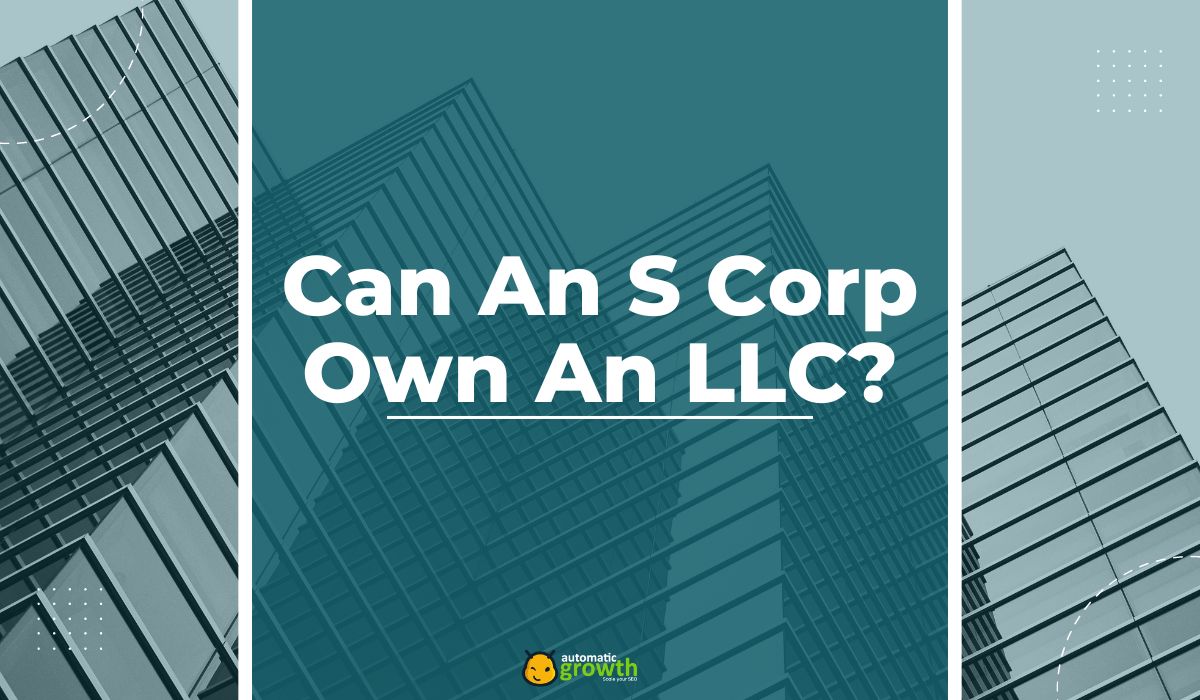Can an S Corp own an LLC? Understanding the interplay between different business entities is crucial in today's dynamic business environment. Whether you're considering restructuring your business, diversifying your investments, or simply curious about the legal possibilities, this article offers a detailed examination of the relationship between S Corporations and Limited Liability Companies (LLCs).
What Is An LLC?
An LLC, or Limited Liability Company, is a flexible business structure available in the United States. It combines elements of both partnerships and corporations, offering the personal liability protection of a corporation with the tax benefits and operational flexibility of a partnership. In an LLC, owners are referred to as "members," and the structure can consist of a single individual (single-member LLC) or multiple individuals (multi-member LLC).
LLCs are popular for their simplicity in setup and operation, and because they protect members' personal assets from the company's debts and liabilities. For tax purposes, LLCs are typically treated as pass-through entities, meaning that business income is taxed on the members' personal tax returns, avoiding the double taxation that corporations can face.
Fast Facts
“LLC provide the limited liability protection found in corporations with the pass-through taxation benefits typical of partnerships.”
What Is An S Corp?
An S Corporation, or S Corp, is a special type of corporation created through an IRS tax election. [1] It is designed to avoid the double taxation that typically occurs with traditional C Corporations. In an S Corp, profits and some losses are passed directly to the owners' personal income without being subject to corporate tax rates.
Not all corporations are eligible to be S Corps; there are specific criteria that must be met, including limits on the number of shareholders (100 or fewer), who must be individuals (not corporations or partnerships), and must be U.S. citizens or permanent residents
This type of business structure also has restrictions on the types of stock they can issue. Like LLCs, S Corps offers limited liability protection, but they operate and are taxed somewhat differently, adhering to the specific regulations and guidelines set by the IRS.
Can An S Corp Own An LLC?
Yes, an S Corporation can own an LLC. This setup allows an S Corp to be a member (owner) of an LLC. This arrangement can be used for various strategic reasons, including business expansion, tax planning, or liability protection. However, there are important considerations and potential implications:
-
Tax Consequences: The tax treatment of the LLC can be affected by its ownership. If an S Corp owns an LLC, the LLC can still be a pass-through entity, but its tax reporting may be more complex, especially if the S Corp is not the sole member.
-
Eligibility for S Corp Status: The ownership structure must not violate the S Corp eligibility criteria. For instance, an S Corp cannot have more than 100 shareholders and all shareholders must be individuals, certain trusts, or estates. If the LLC is treated as a separate legal entity, it could potentially jeopardize the S Corp's status.
-
Legal and Operational Implications: The interaction between state laws governing LLCs and S Corps can be complex. It’s important to ensure that the arrangement complies with both federal and state laws, including those related to management structure, distribution of profits, and liability protection.
-
Asset Protection and Liability: While an S Corp owning an LLC can offer some liability protection, the specifics depend on state laws and the details of the operating agreements. It's crucial to structure the relationship properly to maintain the liability protection of both entities.
-
Administrative Complexity: Having an S Corp own an LLC can add layers of administrative and regulatory complexity. This includes separate record-keeping, tax filings, and potentially different compliance requirements for each entity.
Due to these complexities, it’s advisable for business owners considering this structure to consult with legal and tax professionals. They can provide guidance specific to the business’s circumstances, ensuring both legal compliance and tax efficiency.
Restrictions on S Corp Owning an LLC
Eligibility Criteria for S Corporations
S Corporations face strict eligibility criteria set by the IRS. These include limitations on the number and type of shareholders. An S Corporation can have no more than 100 shareholders, and shareholders must be individuals, certain trusts, or estates. Corporate entities or partnerships typically cannot be shareholders in an S Corp, which can complicate an S Corp's ownership of an LLC.
Tax Classification of the LLC
LLCs are found in virtually every sector of the economy, but they are particularly prevalent in real estate, professional services, and construction industries. [2] The tax classification of the LLC can impact the S Corporation's status. If the LLC elects to be taxed as a corporation and the S Corp owns it, this might conflict with the S Corp's shareholder restrictions. However, if the LLC is taxed as a disregarded entity or a partnership, it might be more feasible.
State Law Considerations
State laws regarding corporations and LLCs can vary, and these may impose additional restrictions or considerations on how an S Corp can own an LLC. It’s crucial to understand and comply with the specific legal requirements in the state(s) where the entities operate.
Allocation of Income and Loss
The pass-through taxation aspect of an LLC owned by an S Corp can be complex, especially in allocating income, losses, deductions, and credits to the S Corp, which in turn must adhere to its own tax reporting requirements.
Fast Facts
“Unlike S Corporations, which have a limit on the number of shareholders, LLCs can have an unlimited number of members.”
Operational Complexity
An S Corp owning an LLC adds a layer of operational complexity. Each entity must maintain separate records, comply with different regulatory requirements, and potentially face different legal obligations.
Potential Impact on S Corp Status
The IRS scrutinizes the ownership structure of S Corps closely. If an S Corp's ownership of an LLC leads to a violation of the S Corp requirements (such as having an ineligible shareholder), the S Corp could lose its tax status.
Given these considerations, it's highly advisable for businesses contemplating this structure to seek professional advice from legal and tax experts. They can provide tailored guidance and ensure compliance with all relevant regulations while optimizing the tax and legal benefits of the arrangement.
















